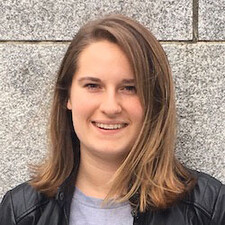Liman Fellow Alyssa Peterson ’19: Law and Organizing During COVID-19
As a 2019-2020 Liman Fellow at The Center for Popular Democracy’s Brooklyn, N.Y. office, Alyssa Peterson ’19 worked with community groups to organize around relief for unemployed workers and better working conditions for essential workers. Before the pandemic, she focused on efforts to challenge corporate power. She wrote this essay for The Liman Center Reports in the summer of 2020.
As a fellow at The Center for Popular Democracy (CPD), I learned how to leverage my legal knowledge on behalf of grassroots organizations that organize workers and build power for communities. The devastation of the COVID-19 pandemic has further demonstrated that the interests of unemployed people, essential workers, and small businesses — the people who create and build wealth in the economy — are aligned in opposition to the interests of billionaires and corporations.
My fellowship has shifted drastically in response to COVID-19, but its essential theme — challenging corporate power — has remained the same. In the fall of 2019, I primarily worked on our forced arbitration and fair workweek campaigns, but my efforts shifted in March of 2020 to respond to the massive surge in unemployment.
Corporations have increasingly relied upon forced arbitration to thwart enforcement of labor laws and other critical protections. Once a worker has signed a forced arbitration clause, one of their few options to address violations of their rights is private arbitration, where the deck is stacked against workers and in favor of employers. Faced wit

At the same time, I also supported our fair workweek campaign. At the state level, our efforts in New Jersey, Washington, and Connecticut focused on reforms to ensure that workers are compensated for on-call shifts and last-minute changes. At the federal level, we supported the introduction of the Schedules That Work Act and the Part-Time Workers’ Bill of Rights Act. These legislative vehicles would address the interconnected issues of underemployment and abusive scheduling practices. Many corporations intentionally hire large numbers of workers, but give them very few hours, thereby ensuring that the company does not have to pay for workers’ benefits. By maintaining a large and desperate labor force, corporations are able to reschedule shifts with little notice, in the knowledge that workers will accept the shifts. This dynamic greatly increases instability within people’s lives and can make it impossible for them to secure childcare and have free time.
In response to the COVID-19 pandemic, my work pivoted sharply to unemployment insurance (UI). Millions of workers lost their jobs or had their hours cut as businesses closed to contain the virus. As part of the Coronavirus Aid, Relief, and Economic Security (CARES) Act relief package, Congress expanded UI to include gig workers and low-income workers, which are groups that have been traditionally excluded from benefits. Congress also added 13 weeks of eligibility. And finally, thanks to progressive leaders, Congress included $600 weekly payments to unemployed workers, on top of their state benefits.
From March to June 2020, my work primarily focused on supporting CPD’s state affiliates in their efforts to organize unemployed workers. During this period, workers faced (and continue to face) inordinate delays and hurdles in their ability to access benefits. We experimented with different methods to identify unemployed workers and bring them into our network, which has included weekly info sessions and limited service legal clinics. Once we identified workers and moved them into unemployed worker organizing committees, we then organized lobbying efforts to improve the state unemployment systems. In Louisiana, workers secured a hearing on reforms to the UI system and pressed their case against a labor committee that is exceedingly hostile to workers’ rights. These workers were then able to go to the governor’s mansion on Juneteenth to deliver a petition demanding further changes to UI administration.
In late June, we began to organize a national campaign — Unemployed Action — to fight for an extension of the $600 weekly payments. We partnered with MoveOn.org, which had a petition initiated by an unemployed worker that had garnered 1.5 million signatures. We also engaged our unemployed worker committees at our affiliates. By working with MoveOn, we were able have 14,000 people use a private web-based discussion platform, which allowed unemployed workers to take action and support each other during this crisis. At the same time, we began to hold weekly mass organizing meetings, which are routinely attended by over 500 people. We have used our mass organizing meetings to update workers about the campaign’s direction, highlight efforts by our volunteers, and train workers on how to do outreach using a peer texting app.
Our organizing efforts have paid off. Since July 15, 2020, we have organized almost 30 events, with a number of the in-person events directly organized by volunteers from our Unemployed Action network. Our 200 trained texters have sent almost 1 million outreach messages. Our network made 20,000 calls to Senate offices over a four-day period. We have also garnered national media attention by outlets including The New York Times, The Washington Post, PBS, and Teen Vogue, in addition to state and local press coverage. Six workers in our base testified before the House Ways and Means Committee on July 31, 2020.
As of August 2020, we are still in the fight with unemployed workers to secure the $600 payments. The position of opponents has dramatically shifted over the past month, all due to the mass mobilization of impacted workers. This fellowship has solidified my faith in organizing, as well as my belief that community lawyering should encompass both legal and nonlegal tactics, depending on the fight at hand.


